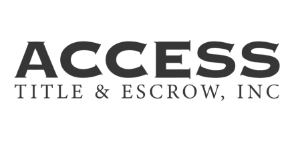
27 May What are title fees?
Understanding Title Fees: What Buyers & Sellers Should Know
When you’re buying or selling a home, there’s a long list of people involved—real estate agents, lenders, inspectors, appraisers. But one of the key players who often works behind the scenes is the title company.
If you’re wondering what role they play and why you’re paying title fees, you’re not alone.
Let’s explain what a title company does. We will also look at the fees involved. You will see what you can expect to pay, whether you are the buyer or the seller.
What Does a Title Company Do?
In essence, a title company ensures the property you are purchasing or selling possesses a clear title. This involves confirming there are no legal complications—such as liens, conflicts, or mistakes—that might obstruct the transaction or the property’s ownership.
Here’s a quick look at the core services a title company provides:
- Title Search: They dig into public records to confirm the property has a clear ownership history and that no outstanding debts or claims exist.
- Title Insurance: They offer protection (usually to the buyer and the lender) in case any issues arise with the title after the sale.
- Closing Services: Many title companies also handle the closing process—coordinating paperwork, disbursing funds, and making sure everything is signed, sealed, and delivered.
These title services ensure that the transaction is legal, secure, and properly documented—giving both buyers and sellers peace of mind.
Common Title Fees Explained
Let’s be honest – nobody loves hidden fees, especially in an already expensive process like buying or selling a home. So what exactly are you paying for when it comes to title services?
Here are some common title fees you might see listed on your Closing Disclosure or Settlement Statement:
1. Title Search Fee
This covers the cost of researching the property’s history. The title company checks court records, past deeds, tax records, and other public documents to ensure there are no ownership disputes or claims.
- Typical range: $75–$200
- Who pays?: Usually the buyer, but it can vary depending on local customs.
2. Title Insurance
There are two types of title insurance:
- Lender’s Title Insurance: Required by most mortgage lenders to protect their investment.
- Owner’s Title Insurance: Optional, but highly recommended—it protects you, the buyer, from future legal claims against the property.
- Typical cost: Can range from $500 to $2,000+ depending on the property value and location.
- Who pays?: Often negotiable. In some areas, it’s customary for the seller to pay for the owner’s policy, while the buyer pays for the lender’s policy.
3. Settlement or Closing Fee
This is the fee for the title company to coordinate and conduct the closing. That includes preparing documents, facilitating signatures, handling fund disbursement, and recording the new deed.
- Typical range: $300–$800
- Who pays?: Usually split between buyer and seller, but practices vary.
4. Recording Fees
Local governments charge a fee to officially record the new deed and mortgage in public records.
- Typical range: $25–$250 (depends on your county)
- Who pays?: Generally the buyer.
5. Courier, Wire, and Administrative Fees
These fees cover the cost of delivering documents, wiring funds, and handling the behind-the-scenes logistics of the closing.
- Typical range: $50–$200
- Who pays?: Typically the buyer, though some may be shared.
What Should Buyers Expect?
As a buyer, your main title-related responsibilities include:
- Paying for the title search
- Purchasing lender’s title insurance
- Deciding whether to buy owner’s title insurance (again, we recommend it)
- Covering closing and recording fees
You’ll typically work closely with the title company leading up to your closing day, especially as documents are prepared, final amounts are calculated, and funds are transferred. Don’t be afraid to ask questions—reputable title companies will walk you through every step.
What Should Sellers Expect?
As a seller, your title responsibilities may include:
- Paying for the owner’s title insurance policy (depending on local customs)
- Providing any necessary documents to the title company (like payoff info for your mortgage)
- Possibly covering part of the closing fee
If you’re offering any seller concessions, those may also factor into how title and closing costs are split. Your real estate agent and the title company can help explain what’s typical in your market.
Why Title Fees Vary
Title fees aren’t one-size-fits-all. A few things that can influence the total cost include:
- Location – Fees can vary by state, county, and even by individual title company.
- Home value – The higher the purchase price, the higher the title insurance premium.
- Loan type – Some mortgage types require additional paperwork or specific insurance coverage.
- Negotiated terms – In some cases, buyers and sellers negotiate who pays for what.
If you’re comparing title companies, ask for a fee sheet or quote up front. Many companies will provide a Good Faith Estimate or even an online calculator so you can see a breakdown before you commit.
Final Thoughts: Don’t Skip the Details
Title fees might seem like just another line item in a long list of closing costs—but they represent essential work that protects your investment and ensures your transaction runs smoothly. Whether you’re buying your first home or selling your tenth, working with a local, experienced title company can make the process easier and more secure.
Want to know exactly what you’ll pay at closing? Reach out to our team. We’re happy to walk you through the details, break down costs, and make sure there are no surprises on your closing day.
Need Help with Your Next Closing?
We’ve helped local buyers, sellers, agents, and lenders close with confidence for over 40 years. Whether it’s your dream home or your latest investment property, we’re here to guide you every step of the way.
Contact us today to learn more about our transparent pricing and friendly service.

